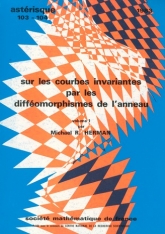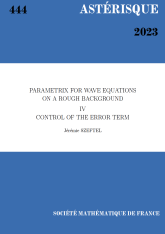Sur les courbes invariantes par les difféomorphismes de l'anneau, Vol. I
Sur les courbes invariantes par les difféomorphismes de l'anneau, Vol. I

- Consulter un extrait
- Année : 1983
- Tome : 103-104
- Format : Électronique, Papier
- Langue de l'ouvrage :
Français - Nb. de pages : 232
- ISBN : ISBN-13 978-2-85629-405-5
In chapter I we give an exposition of D. Birkhoff's 1920 theory of curves invariant by area preserving monotone twist maps of an annulus $A = T \times \mathbb{R}$ (a curve means an $C^{0}$-embedded circle that we suppose non-homotopic to zero). In an appendix to chapter I Albert Fathi gives a more topological proof of Birkhoff's theorem about curves being graphs.
Using Birkhoff's theory we show that Moser's invariant curve theorem (improved by H. RUssmann) is optimal up to $\epsilon > 0$ : in particular we show in chapter II that usually for $C^{3-\epsilon}$-perturbations of a $C^{\infty}$-complete integrable monotone twist map there exists no invariant curve of a fixed rotation number. We give another proof of this result in chapter III, by constructing an area preserving $C^{3-\epsilon}$-diffeomorphism $f$ of $A$ that leaves invariant a curve $C$ and such that $f/C$ is a Denjoy counter-example. In chapter II we also give counter-examples to stability for $C^{2-\epsilon}$-perturbations and other results on the optimal character of the known invariant curve theorem. In chapter III, at the end, we give some insight of the geometry of the set of "standard-diffeomorphisms" of A that leave invariant a curve. In chapter IV we prove H. Rfissmann's translated curve theorem in class $C^{3+\epsilon}$, $\epsilon> 0$, if one restricts the rotation number on the translated curve to be a number of constant type. (The translated curve theorem is a non conservative generalization of Moser's invariant curve theorem.) The proof makes use of special properties of numbers of constant type, standard facts on Holder functions, and only requires Schauder-Tychonoff's fixed point theorem. We believe that the method is simpler than the other existing techniques.
A volume II is planned and will be about more elaborate existence theorems of invariant curves.


